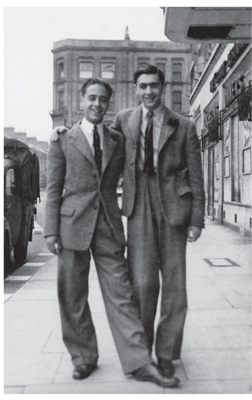Evacuee Boys (28 page)
Authors: John E. Forbat
It is pouring with rain now, and when I have finished this letter, we are going to have a look at a museum.
Last night we had a look at a local Scout troop, and to-morrow we shall see the local cubs. On the whole I have had a really enjoyable time, so you need not worry. If I come home with a Yorkshire accent, don’t be surprised.
Andrew and John, around 1944. (Author’s collection)
I must close now, so cheerio for now & love to all from your

John
35
Puszi
are kisses.
36
With school friend Alex Fullick, staying with his auntie.
37
French Rover Scout befriended at summer camp.
38
The new Morris 8 car.
39
The current Scoutmaster.
40
Scout leaders’ meeting.
41
Court of Honour (a regular council of Scouts).
42
A female Cubmaster.
43
Compulsory war service initiated by Ernest Bevin, Minister of Labour.
Andrew qualified as a doctor in 1947 and became a consultant anaesthetist. I (perhaps after following Andrew’s good advice) matriculated with four Distinctions and three Credits in 1945 (Andrew had received three Distinctions and four Credits!) and after Higher Schools/ Inter BSc in 1947. With floods of servicemen returning from the war I was unable to get onto a full-time degree course, instead attending London’s Northampton Polytechnic for Aeronautical Engineering two days a week. I qualified in 1950 with a University of London B.Sc. (engineering) degree, having completed the degree in the same time as the full-time students.
On reaching the age of 21, we respectively became British Subjects by Naturalisation. Andrew served two years of National Service as a medical officer in the army; his successful medical career in London eventually led to his immigration to the USA, where he continued practising anaesthesia and much work with the Christian Church.
After spending time as a Missionary in India, Andrew married at the relatively advanced age of 34, to a dietician and fellow missionary in India. They had two sons and his family also immigrated to the USA, where Andrew and his wife gained four grandchildren.
I became an aeronautical engineer, working on highly secret guided weapons at Vickers-Armstrongs (Aircraft) Ltd. While at Vickers, I learned to fly powered planes and gained my private pilot’s license. I remained in defence-related positions until I became the entrepreneurial managing director of an engineering company, where I built a dominantly export-led business in automobile safety and in security systems – financed by ‘bootstrapping’.
I married at the age of 24 to an opera singer; we had five children and ten grandchildren. At the age of 52 I lost everything to unethical ‘partners’ and, with nothing, immigrated to the USA where I started my own businesses and remained until retiring at age 73. Having realised my ‘American dream’, I retired with savings and the proceeds from selling my company.
Without doubt, our evacuation experiences involving hardship, poverty and loneliness away from our parents and family contributed to both our resilience and our subsequent determination to overcome difficulties. It helped us to make a success of our careers – and of our life-long marriages. We remained very busy into our 80s.
By Andrew Forbat
It is interesting to look back on these letters after the passage of over seventy years. Even if some of the details have become dim with time, the experience is still very real to me. We had come from Hungary only three years before the outbreak of the war. Our parents still had the ideas of a middle-class, non-practicing Jewish family. Evacuation gave us our first experience of living with a gentile English family and the different standards and attitudes to be expected. Our English was adequate, but not nearly perfect, either in accent or vocabulary. I notice in reading these letters, that when Mr Kelly scolded me I wrote he kept interrogating me – when I meant interrupting! Afterwards, we were immersed in the English language, so that the entire experience was very educational.
Communication with our parents had to be by mail. A telephone call from Melksham would have necessitated a trunk call and we could not use our hosts’ phone for that. On the other hand, in England, we could rely on a letter mailed before the last collection to arrive at its destination by the following morning.
We did not realise at the time the great danger in which Britain was. There was never any doubt in our minds that the Allies would have victory and that Hitler would be defeated. Despite shortages, rationing, blackout and hardships, there has never been a greater sense of unity and co-operation among the British people. We had a united purpose and determination, and it is our privilege to have experienced those days.
Front cover photograph
: Evacuee boys with their gas masks. (Public information);
back cover photograph
: An Auster like the one John flew. (By kind permission of Mr Phillip Jarrett)
First published in 2012
The History Press
The Mill, Brimscombe Port
Stroud, Gloucestershire,
GL
5 2
QG
This ebook edition first published in 2012
All rights reserved
© John E. Forbat, 2012
The right of John E. Forbat to be identified as the Author of this work has been asserted in accordance with the Copyrights, Designs and Patents Act 1988.
This ebook is copyright material and must not be copied, reproduced, transferred, distributed, leased, licensed or publicly performed or used in any way except as specifically permitted in writing by the publishers, as allowed under the terms and conditions under which it was purchased or as strictly permitted by applicable copyright law. Any unauthorised distribution or use of this text may be a direct infringement of the author’s and publisher’s rights, and those responsible may be liable in law accordingly.
EPUB ISBN
978 0 7524 7825 8
MOBI ISBN
978 0 7524 7824 1
Original typesetting by The History Press
Ebook compilation by RefineCatch Limited, Bungay, Suffolk